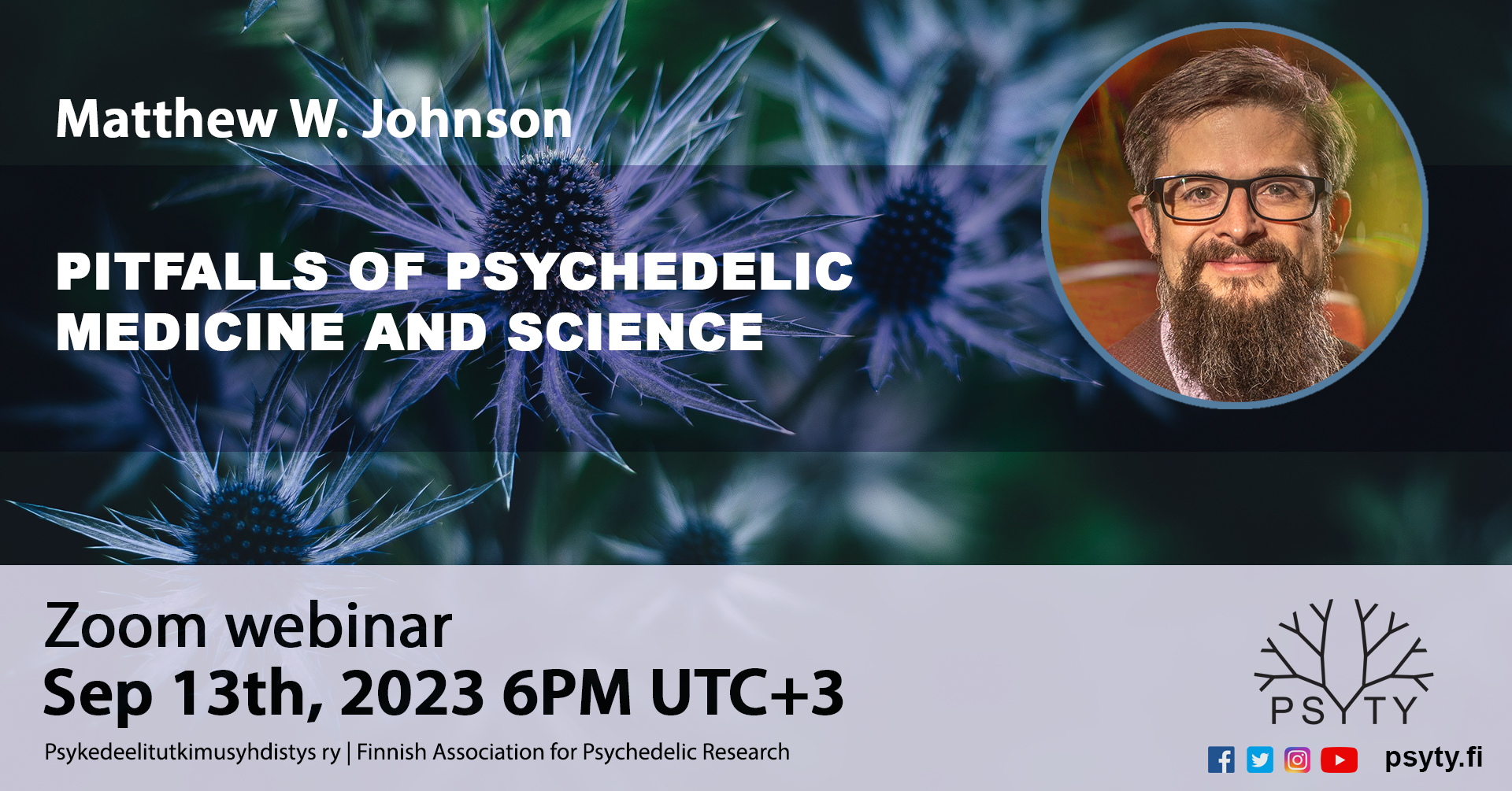Webinar September 13th 2023 | Matthew W. Johnson – Pitfalls of Psychedelic Medicine and Science

It is not uncommon for high dose psychedelic experiences to involve “big questions,” for example: What is the meaning of life? What is the nature of reality? Does God exist? In Psyty’s webinar presentation held on Wednesday, September 13th at 6PM UTC+3, Dr. Matthew W. Johnson will discuss the responsible handling of such experiences in therapeutic contexts.
Psychedelic experiences are believed to increase suggestibility and to occasion highly personal and meaningful experiences for patients. For this reason, a common but dangerous tendency for clinicians and scientists is to assume that psychedelic therapy constitutes an exception to many accepted clinical and ethical norms. Jonhson argues, however, that the intensity and meaningfulness of psychedelic effects call for even greater attention and adherence to the wisdom of clinical boundaries and norms.
Johnson argues that it is critical in clinical practice to let the patient determine her or his own metaphysical meaning, if any, from psychedelic experiences, rather than to impose or introduce the clinician’s own metaphysical beliefs, even ones that may seem innocuous to the clinician or scientist such as the “perennial philosophy.” Clinicians and scientists must avoid falling into the roles of guru or religious leader, and only introduce concepts grounded in their professional, empirically informed expertise.
Finally, regarding the science of psychedelics, much has been stated on the propensity of psychedelics to “expand consciousness”, and scientists have viewed psychedelics as tools to understand the “nature of consciousness.” Johnson calls for scientists to use precision when discussing concepts referred to as “consciousness” such as phenomenal consciousness, access consciousness, and self-concept, and be cautious to not overstate what is scientifically known regarding the relation between psychedelics and these concepts. He argues that scientists should do a better job with phenomenology regarding psychedelics and these concepts, meaning that we need to be judicious in distinguishing insights that people claim to have about, for example, phenomenal consciousness in psychedelic experiences, from what we can objectively claim to have learned about phenomenal consciousness from psychedelic research.
Tickets are available from our web store. For members of the association who’ve paid their membership fee for 2023, the event is free of charge. If you want to pay your membership fee for this year or become a member, you’ll find our membership products on the main page of our web store. An email with a link for free registration to the event has been sent to members of the association. If you’re not sure if you’ve paid for your membership this year, feel free to ask us.
Matthew W. Johnson, Ph.D., is The Susan Hill Ward Endowed Professor of Psychedelics and Consciousness Research at Johns Hopkins. Working with psychedelics since 2004, he has played a role in the modern-day revival of psychedelic research. He has published research on psychedelics and mystical experience, personality change, tobacco smoking cessation, cancer distress treatment, and depression treatment. In 2021 he received as principal investigator the first grant in about 50 years from the US government to administer a classic psychedelic as a treatment, specifically psilocybin for tobacco addiction. He is also known for his expertise in behavioral economics, addiction, sexual risk behavior, and research with a wide variety of drug classes. He has been Interviewed by Anderson Cooper on 60 Minutes, the New York Times, the Washington Post, the Wall Street Journal, CNN, NPR, Fox News, BBC, the Lex Fridman Podcast, and in Michael Pollan’s book How to Change Your Mind.

Comments are Disabled